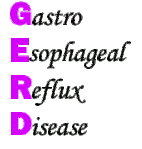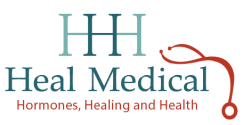 I was a little unsettled by an article published in JAMA recently. The study presents two options for gastroesophageal reflux disease (GERD) as if there are only two options: surgery (Laparoscopic anti-reflux surgery or LARS), or medication in the form of an acid-blocking drug, esomeprazole (Nexium, the purple pill). The results of the study at 5 years showed 92% remission in the esomeprazole group and 85% remission in the LARS group. Then they report the prevalence and severity of symptoms with either treatment: 8-16% for continued heartburn, 2-13% for acid regurgitation, 5-11% for dysphagia. OK, pretty good but wait: 28-40% for bloating and 40-57% for flatulence, which by the way are symptoms of LOW acid in the stomach, and 4 deaths in the esomeprazole group and 1 death in the LARS group. Serious adverse events occurred at a rate of 24-28% in both groups. They conclude “patients with GERD who are initially responsive to PPIs achieve and remain in remission at 5 years…using either LARS or esomeprazole…”
I was a little unsettled by an article published in JAMA recently. The study presents two options for gastroesophageal reflux disease (GERD) as if there are only two options: surgery (Laparoscopic anti-reflux surgery or LARS), or medication in the form of an acid-blocking drug, esomeprazole (Nexium, the purple pill). The results of the study at 5 years showed 92% remission in the esomeprazole group and 85% remission in the LARS group. Then they report the prevalence and severity of symptoms with either treatment: 8-16% for continued heartburn, 2-13% for acid regurgitation, 5-11% for dysphagia. OK, pretty good but wait: 28-40% for bloating and 40-57% for flatulence, which by the way are symptoms of LOW acid in the stomach, and 4 deaths in the esomeprazole group and 1 death in the LARS group. Serious adverse events occurred at a rate of 24-28% in both groups. They conclude “patients with GERD who are initially responsive to PPIs achieve and remain in remission at 5 years…using either LARS or esomeprazole…”
This seems to me a very high price to pay for a, granted uncomfortable, but certainly not life threatening condition, which is primarily the result of our highly processed Standard American Diet (SAD), and a lifestyle that may include smoking and alcohol. The symptoms of GERD may actually be due to LOW acid as the symptoms are similar. Low acid is associated with hypothyroidism and autoimmune disease, radiation therapy to the stomach, and gastric bypass procedures. GERD can be effectively treated with avoidance of common food allergens such as gluten, dairy, soy, corn, peanuts, and processed foods, perhaps a few digestive enzymes, and probiotics. Since many people with GERD actually have low acid, they frequently respond to acid supplementation.
The stomach is acid for a reason and lack of acid leads to protein deficiency, and vitamin (C, K,, and B complex) and mineral (magnesium and zinc) deficiencies as well. LOW stomach acid can lead to abnormal bacterial overgrowth, which can lead to further malabsorption of vital nutrients. Normal stomach acid serves to keep the appropriate bacterial flora of the gut and respiratory system in balance.
An article from JAMA in 2009 found an increased risk for pneumonia in hospitalized patients, who are given PPIs routinely on admission to prevent stress induced compromise (ulcers and inflammation) of the GI mucosa.
I think we should think twice before committing a person to long-term acid blocking drugs, which can have serious long-term consequences.
The study was sponsored by Astra Zenega,, makers of Nexium.
Still think food doesn’t matter? Watch this video: http://www.youtube.com/watch?v=r4DOQ6Xhqss


I am on high does of PPI, do all the life style restrictions, sleep with my head elevated 10 inches, have in the past been diagnosed with erosive esophagitis. I really don’t want to get cancer.
Are their any cases in which patients have taken acid supplementation , along with digestive enzymes, and probiotics to reduce their GERD.
Thank you !
Dear Michael,
Many things contribute to GERD including diet and lifestyle as you mention. Once you get the inflammation going, you are playing catch up and you need to give your body what it needs to heal. Chronic acid suppression leads to poor digestion of many needed nutrients in particular proteins which can contribute to B vitamin deficiencies. The absencee of acid can also lead to overgrowth of pathogenic bacteria and yeast. The use of PPI’s in the hospital is associated with an increased risk of pneumonia. Probiotics, enzymes, essential fatty acids,avoiding certain foods you are sensitive to and providing healing nutrients for the gut can decrease the inflammation and lead to healing and getting off the medication. I would suggest that you seek a doctor that is experienced in functional medicine to help you with appropriate testing and treatment.
I have been suffering from GERD infalmations and for the last two weaks it was getting nearly impossible to pass. Three days ago I was like suffering highest heart beats after dinner and I was sure to have something serious in near future. One morning when i woke up, my mouth was terrible in terms of bad smell and taste.
As i don’t have medical insurance so i tried all searches online for the similar experiences from different people. Finally, I found The LadySoma Detox and read about the reviews, just bought it two days ago and started taking four capsules twice a day as directed. Now I am pain free and feeling great. I would recommend this to people suffering from digestive disorders.
[…] subsequently began to be given for longer and longer periods to control symptoms of GERD (see my blog post). As you might expect, the drug industry takes home billions of dollars due to the ubiquitous […]